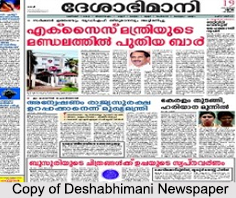 Deshabhimani is one of the most popular Malayalam language newspapers and is headquartered at Kochi, Kerala. The newspaper is working as the mouthpiece of the Kerala State Committee of the Communist Party of India (Marxist), which is the owner of Deshabhimani. Starting with only one edition published from Kozhikode, Deshabhimani now publishes six different editions. The editions are published from the cities like Kochi, Thiruvananthapuram, Kottayam, Trichur, Kannur and Kozhikode.
Deshabhimani is one of the most popular Malayalam language newspapers and is headquartered at Kochi, Kerala. The newspaper is working as the mouthpiece of the Kerala State Committee of the Communist Party of India (Marxist), which is the owner of Deshabhimani. Starting with only one edition published from Kozhikode, Deshabhimani now publishes six different editions. The editions are published from the cities like Kochi, Thiruvananthapuram, Kottayam, Trichur, Kannur and Kozhikode.
History of Deshabhimani Newspapers
The newspaper started its journey on 6th September, 1942 with a view to propagate the views and ideas of CPI (M) and also to promote patriotism among the Indian youth. Though it started as a weekly, it became a daily in 1946. Though Deshabhimani was first published in 1942, it had a predecessor named Prabhatham (which means `Dawn`). The latter was first published in 1935 and was the manifesto of the socialist group in the Indian National Congress. It was transformed into Deshabhimani in 1942, mainly through the efforts of eminent leaders like A K Gopalan, E M S Namboodiripad, etc. E.M.S Namboodiripad, in fact donated all of his ancestral property for raising funds for the newspaper. Soon after its inception, Deshabhimani became the voice for the Communist Party of India and also gained significant popularity among the Keralians.
Supplements of Deshabhimani Newspapers
Various supplements and publications of Deshabhimani have gained massive popularity. The most popular supplements of Deshabhimani include the Deshabhimani Varanthappathippu, Aksharamuttam, Sthree, Kilivaathil, Thozhil etc. and its famous publications include Deshabhimani Varika (Weekly), Chintha Varika (Weekly) and Thathamma (Children`s Publication). Deshabhimani also has an online edition.
Personalities Associated with Deshabhimani Newspapers
Deshabhimani has presented many talented and legendary journalists to Malayalam journalism. Many legendary CPI (M) leaders and Malayalam journalists have served as the editor of Deshabhimani from time to time. These eminent personalities include E.M.S Namboodiripad, V.T. Induchudan, K.P.R Gopalan, V.S. Achuthanandan, etc. Apart from them, several prominent Malayalam journalists were also associated with Deshabhimani at some point of their career. The most notable journalists worked with Deshabhimani include Sunil P Elayidom, CM Abdurahman, P Govindapillai, Narikkutty, A Vijayan, John Brittas, B Aburaj, AV Anilkumar, SS Nandakumar, Shibu Muhammed, K Mohanan, etc. P. M. Manoj is the current Editor and P Rajeev is the current Editor-in-chief and K.J. Thomas is the General Manager of Deshabhimani.
Significance of Deshabhimani Newspapers
Deshabhimani has played an important role to strengthen the roots of the Communist Movement in Kochi and has also served as the platform to project various principles of the party. Though it was established in 1942, the newspaper got significant recognition only in the 1980s. However, it has become one of the best newspapers in Kochi, since then.






